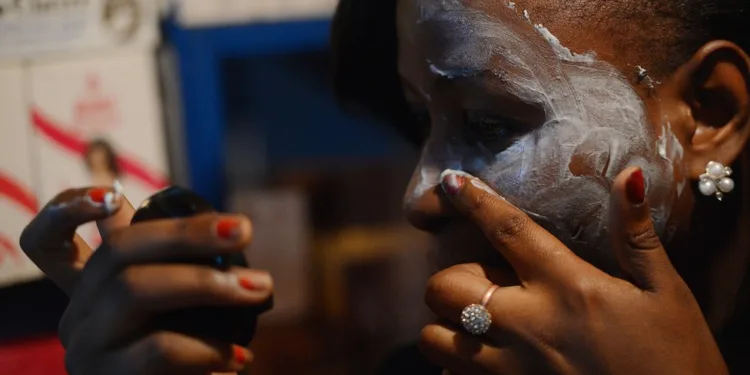Bleaching creams and injections are now being used by scammers on Facebook, and other social media platforms in Cameroon, and other West African countries.
An Ivorian YouTube influencer recently shared her distressing encounter with the deceptive allure of skin-bleaching injections, recounting her disappointment after waiting ten days without seeing any promised results. “Clearly, I’ve been ripped off,” she lamented to AFP.
Further investigation into the situation revealed that one of the many products sold in Ivory Coast lacked any whitening agents upon laboratory analysis. Additionally, numerous products were found to be unregulated and contained hazardous chemicals such as alpha hydroxyl acids (AHAs), commonly used in chemical peels.
Dr. Sarah Kourouma, a dermatologist at Treichville University Hospital in Ivory Coast, shed light on the potential dangers associated with these injections. She revealed that some of the jabs contained potent anti-inflammatories, leading experts to suspect they may contain steroids. Prolonged use of such injections in high doses can result in depigmentation, diabetes, and hypertension, among other serious health complications.
Echoing these concerns, Dr. Grace Nkoro, a dermatologist at the Gynaeco-Obstetric Hospital in Cameroon, emphasized the troubling trend of the increasing popularity of skin-bleaching injections. She recounted cases of patients developing skin problems and even kidney failure after purchasing these injections online.
The widespread availability and promotion of these potentially harmful products pose a significant threat to public health, especially in West Africa where they have gained popularity. Authorities and healthcare professionals alike are urging increased regulation and awareness to protect consumers from falling victim to such fraudulent and dangerous practices.
READ ALSO: American University Confers Doctorate Degree On Enabulele
The testimonies of individuals like the Ivorian influencer serve as stark reminders of the risks associated with the pursuit of unrealistic beauty standards. It is essential for consumers to exercise caution and seek guidance from qualified healthcare professionals before considering any form of skin-lightening treatment.
Bleaching creams and injections
While skin-whitening creams remain prevalent, injectable liquids are gaining popularity, especially among young people. Marcellin Doh, president of a civil society collective in Ivory Coast, highlights that injections are perceived to have faster and more uniform effects. However, compared to creams, the risks associated with injections are less understood, with documented concerns including premature aging and carcinogenic substances.
Specialists confirm the lack of oversight regarding the ingredients or manufacturing process of these injections. Dermatologist Kourouma from Treichville University Hospital in Ivory Coast warned that some injections may contain potent anti-inflammatories, likely steroids, which can lead to depigmentation, diabetes, and hypertension with prolonged use.
Wealthier individuals often opt for expensive glutathione injections, a powerful antioxidant also used in cancer and Parkinson’s treatment. However, frequent injections can result in skin pathologies such as acne and scarring, as observed by Kourouma and echoed by Nkoro from the Gynaeco-Obstetric Hospital in Cameroon. Nkoro reports cases of patients developing skin problems and kidney failure after purchasing injections online.
In Ghana, a public health alert issued in 2021 warned about significant health risks associated with glutathione injections, including toxic effects on the liver, kidneys, and nervous system.
Concerns extend beyond the products themselves to the administration process. Often, injections are provided by merchants in markets or stores, or individuals self-administer them at home, practices deemed illegal by the Ivorian Pharmaceutical Regulatory Authority. Lack of medical supervision raises the risk of spreading communicable diseases such as hepatitis. Improper equipment sterilization can also lead to severe infections, emphasizing the need for caution and proper regulation in the use of skin-lightening injections.
The uncovered scams
The publication reached out to a vendor on social media purporting to sell glutathione injections in Abidjan and purchased a batch of 16 vials and powders manufactured by Dermedical Skin Sciences for 75,000 CFA francs ($124).
A lab analysis conducted by a Paris-based hospital revealed that the vials contained vitamins, proteins, and sugar, but no glutathione.
Efforts to reach out to Dermedical Skin Sciences were unsuccessful. The company’s website lists a laboratory in Milan, Italy, but a search on Google Maps only shows a municipal swimming pool and golf course at the specified address. Also, there is no record of a company registered under the name “Dermedical Skin Sciences” with the Italian Chamber of Commerce.
An Ivorian trader promoting a brand named Glutax informed AFP that a wholesaler in Manila was the source of the products.
Manila, the capital of the Philippines, is known for hosting numerous retailers supplying the African market with skin-whitening products. Further online research confirmed the existence of a Manila-based company called Glutax.
When contacted, the company confirmed its headquarters in the capital and its role as a global distributor of bleaching treatments. However, it’s worth noting that glutathione-based injectables are banned for use in the Philippines due to their potential health hazards.










